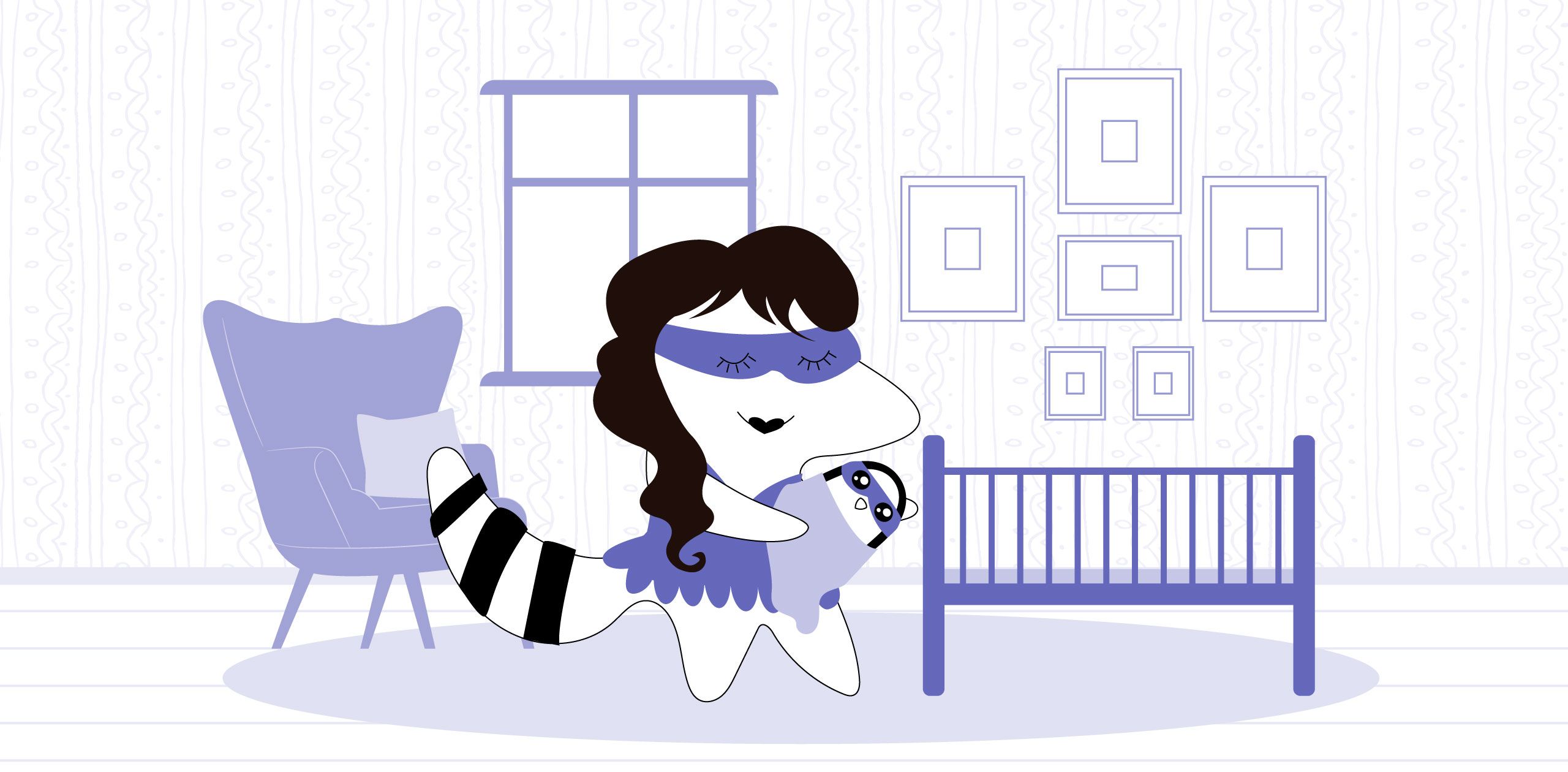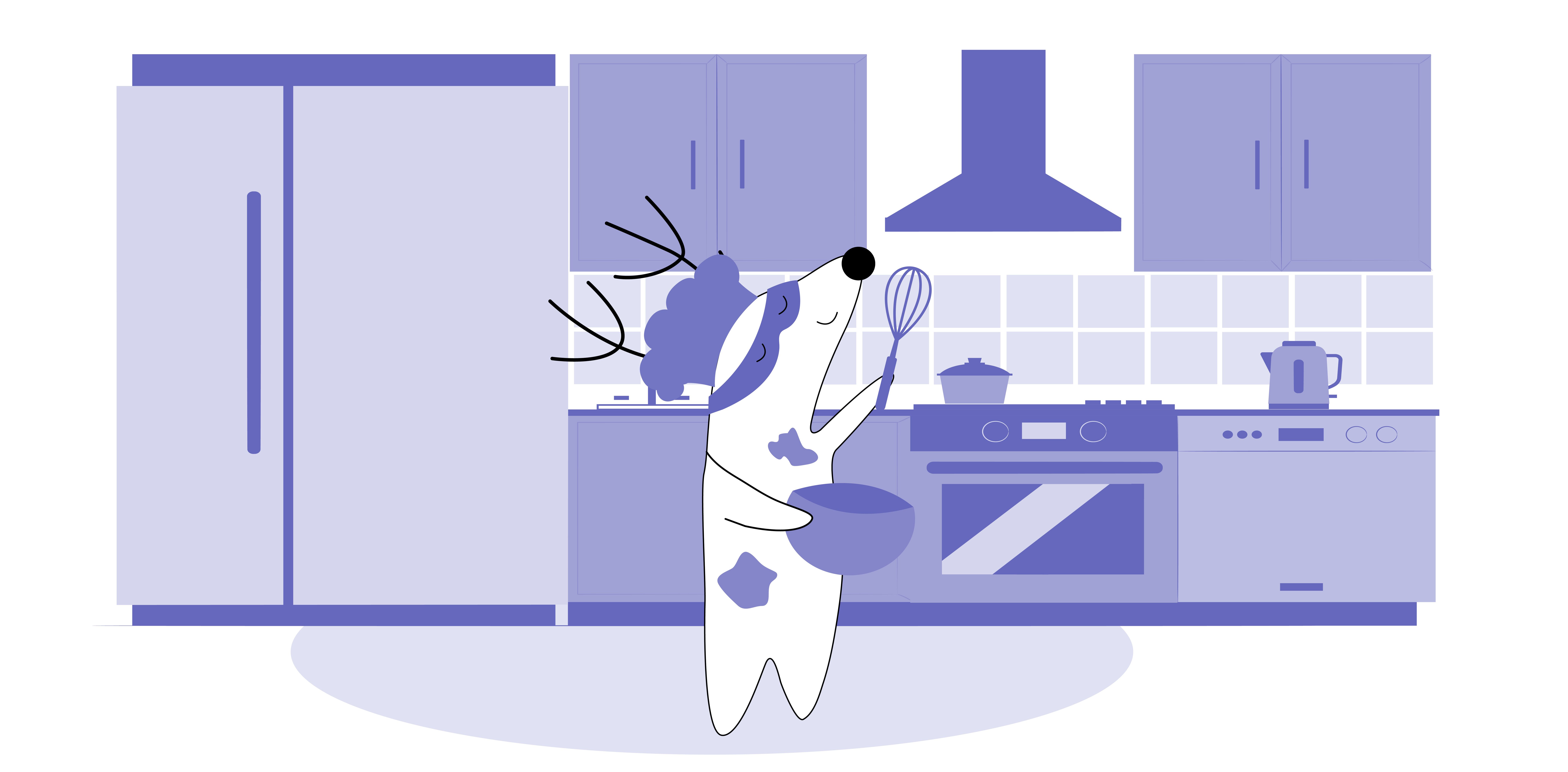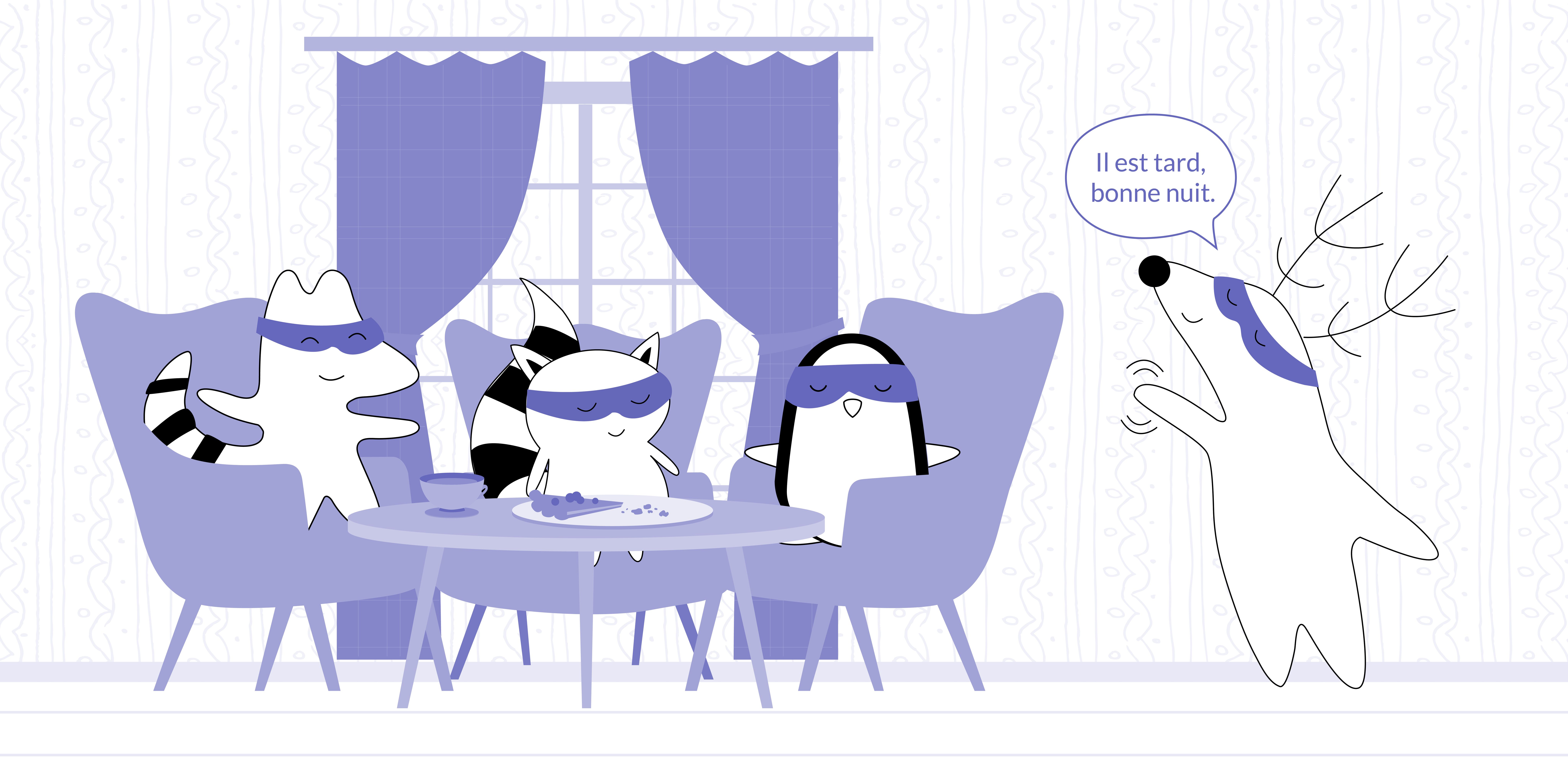
The French language, with its unique blend of softness and strength, has long been seen as the language of romance and sophistication. Its mellifluous phonetics and rich expressions can turn even the simplest of phrases into elegant utterances.
Among these are the many ways one can bid "good night" in French — each phrase imbued with its own unique charm and context.
Saying “good night” is a moment of connection that brings closure to the day. It's a comforting ritual, an intimate act even, that communicates care, safety, and the wish for peaceful rest. In French, this sentiment is beautifully encapsulated in various phrases and expressions.
Whether it's a simple Bonne nuit or a heartfelt Fais de beaux rêves, each phrase is a poetic expression of warmth and affection. In this article, we explore several such phrases to wish someone a good night’s sleep in French, providing practical examples for each to illuminate their use in everyday conversation.
Learn French with Langster
Bonne nuit
Bonne nuit is a standard phrase that encapsulates the wish for a peaceful night. It's a literal translation of the English "Good night," making it an easy and straightforward phrase to remember. This phrase is typically used as a farewell when someone is about to retire to bed.
Although it can be used when parting ways late at night, it is primarily used right before sleep. If someone is leaving a social space to retire to their room for the night, Bonne nuit would also be an appropriate send-off, even if it's slightly early.
However, it's not typically used in a professional setting when someone is leaving the office at the end of the day.
A cultural spin on this phrase is:
French
English
Bonne nuit les petits.
Good night, little ones.
This phrase holds a special place in the collective memory of the French, as it was the title of a beloved TV show that aired throughout the '60s and '70s. Parents and children would watch this show together before bedtime, embedding the phrase deeply into the French culture and nightly rituals of many French households.
Even though the show has long since stopped airing, the phrase continues to be used fondly among adults, serving as a nostalgic reminder of those simpler times.
Here are a few ways to use the French Bonne nuit in a sentence:
French
English
Bonne nuit ma belle.
Good night, beautiful.
Bonne nuit mon amour.
Good night, my love.
Il est tard, bonne nuit.
It's late, good night.
Bonne nuit, à la prochaine!
Good night, see you next time!
Bonsoir
Bonsoir is the French equivalent of "Good evening" and is usually used as a greeting when meeting someone in the evening. For example:
French
English
Bonsoir, une table pour deux, s'il vous plaît.
Good evening, a table for two, please.
However, Bonsoir is also an excellent choice in situations where a formal salutation is required or when it might not be appropriate to imply that the other person is heading off to bed.
Translating directly to "Good evening," this French word can also subtly carry the connotation of "Good night" if used late in the evening or as a parting phrase.
Bonsoir is particularly useful in professional contexts or formal gatherings when you're leaving for the night. It offers a polite and respectful way to bid farewell without making assumptions about the other person's plans post-departure.
French
English
Bonsoir à tous.
Good evening to all.
Bonsoir, merci pour votre temps.
Good evening, thank you for your time.
However, it's worth noting that in some regions, particularly in larger cities, Bonsoir may come across as too formal or slightly old-fashioned among native French speakers. In these areas, the more casual Bonne soirée (which we will explore below) tends to be the preferred choice for wishing someone a good evening.
Bonne soirée
Bonne soirée, often favored in larger cities such as Paris, is a more casual way to say goodnight. This phrase translates to "Have a good evening."
French
English
Passez une bonne soirée!
Have a good evening!
It is typically used when parting ways before the night has ended, wishing the other person an enjoyable rest of their evening without implying that they're heading straight to bed. Still, if it's clear that this is the last time you'll be seeing the person for the day, the phrase takes on the spirit of a "good night" wish.
A perfect example of its use would be after a dinner outing, when it's late, and your friend is about to leave.
French
English
Merci pour le dîner, bonne soirée.
Thanks for the dinner, have a good evening.
It might be unrealistic to assume they're going to bed at 9 pm, so instead of saying Bonne nuit, you should instead opt for Bonne soirée, wishing them an enjoyable continuation of their night.
Some other examples of using the French Bonne soirée include:
French
English
Je dois partir, mais bonne soirée à tous.
I have to leave, but have a good evening everyone.
Bonne soirée, à demain.
Have a good evening, see you tomorrow.
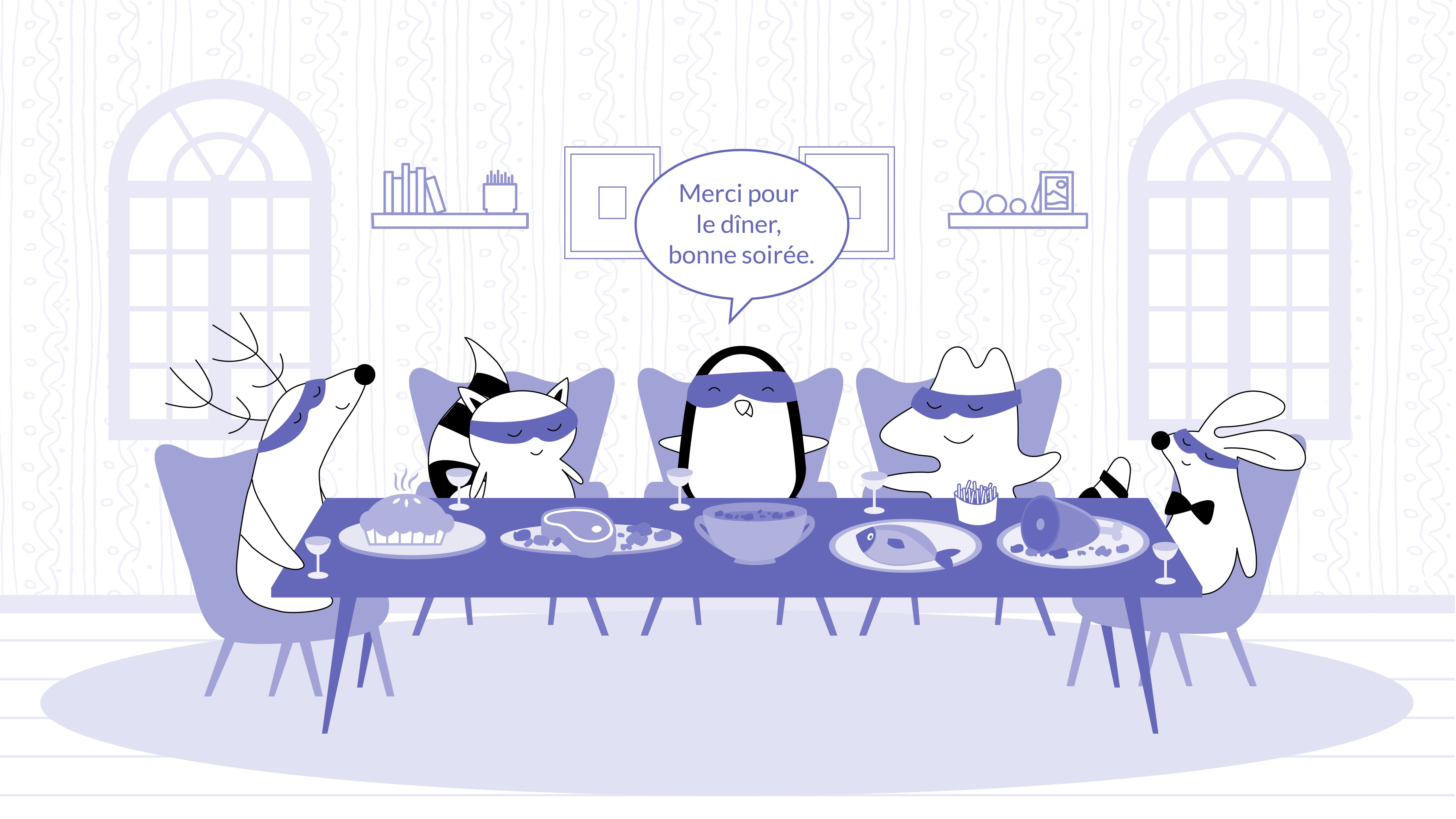
Á demain
À demain, a more casual and informal phrase, is frequently used in French. This phrase’s literal translation is "until tomorrow," but a native French speaker will often use it in the context of saying "see you tomorrow."
In essence, À demain goes beyond a simple “good night” — it subtly communicates the expectation of seeing each other again the following day, making it both a goodbye and the promise of a future hello.
Here are some examples:
French
English
À demain, bonne soirée!
See you tomorrow, have a good evening!
C'était une belle journée, à demain.
It was a beautiful day, see you tomorrow.
Bonne nuit et à demain.
Good night, and see you tomorrow.
Dors bien/Dormez bien
Dors bien, or "Sleep well," is a more personal and intimate way to say “good night” in French. This phrase is ideal for interactions with people you know well and care about.
It carries a touch more affection than the standard Bonne nuit and aligns closely with English-speaking norms.
French
English
Repose-toi et dors bien.
Rest and sleep well.
The only distinction to keep in mind is that Dors bien is typically used in informal settings, while Dormez bien is more formal or, in this case, directed to several persons. To a friend staying over, you will say:
French
English
Bonne nuit, dors bien.
Good night, sleep well.
However, as a hotelier to new guests, you will say:
French
English
Bonne nuit, dormez bien.
Good night, sleep well.
For those who appreciate a touch of poetry in language, there's a longer French expression that adds a bit of heavenly charm:
French
English
Dors avec les anges.
Sleep with the angels.
While such a phrase might seem unusual in cultures where sleeping with angels is associated with death, it's important to note that Romance languages often use angel references in a more positive light.
This sentiment is not unique to French; certain Spanish-speaking regions also have a similar saying: Que duermas con los angelitos.
So, if you're looking for a way to say “good night” that's a little more poetic and heartfelt, these phrases might be just what you need.
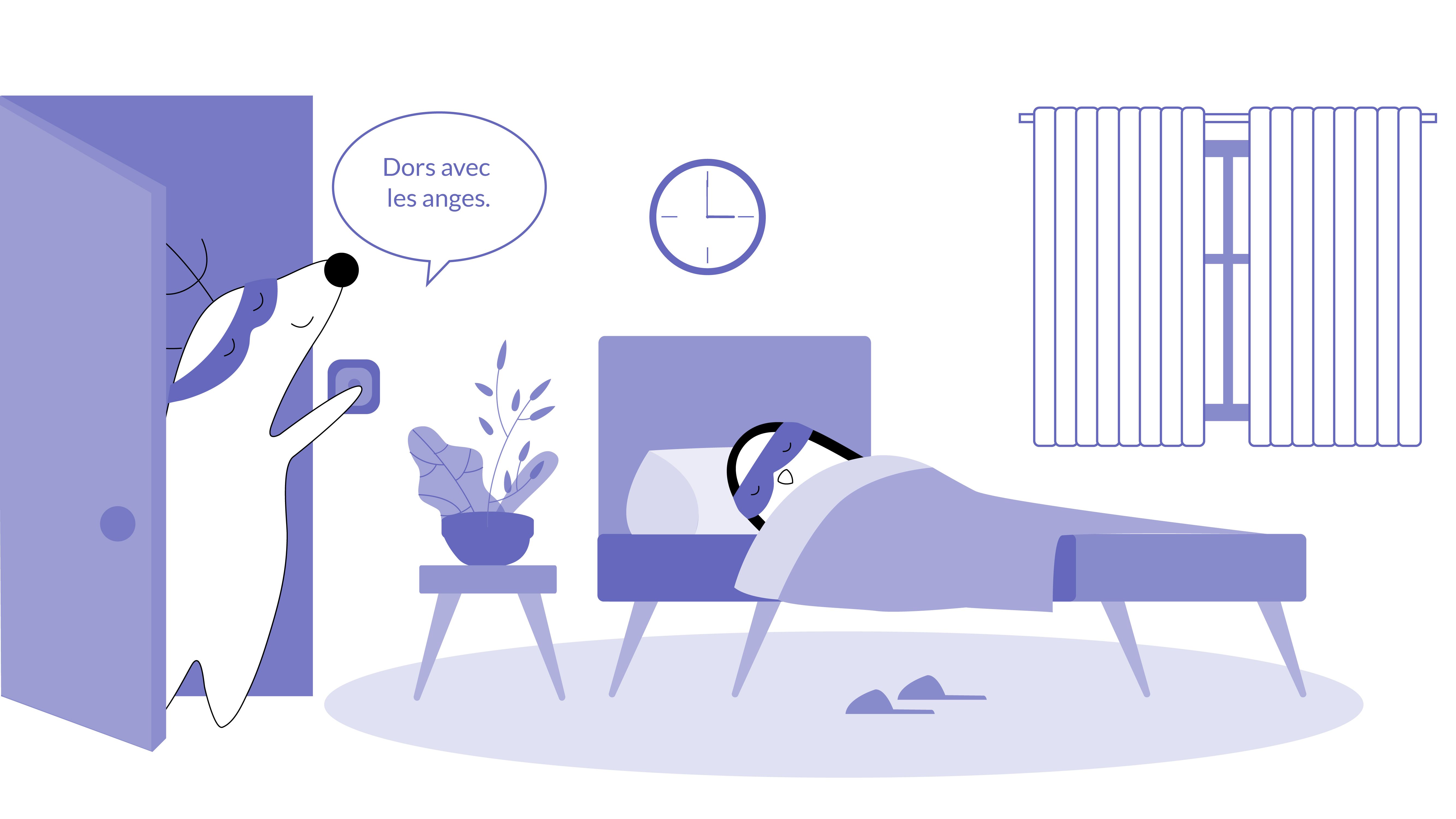
Fais de beaux rêves
Fais de beaux rêves is another phrase that places emphasis on the quality of sleep. Translated literally, it means "have beautiful dreams." This phrase is the French equivalent of the English saying "Sweet dreams."
French
English
Fais de beaux rêves.
Sweet dreams.
This endearing phrase is a beautiful choice when you're all retiring to bed within the same dwelling. It's fitting for intimate relationships, such as with a partner, or even casual ones, like roommates and dorm buddies.
Additionally, it's a popular choice for wishing young children a good night's sleep filled with beautiful dreams.
So, the next time you want to wish someone not just a good night but a night filled with lovely dreams, Fais de beaux rêves is the perfect phrase. Here’s how to use it:
French
English
Bonne nuit, fais de beaux rêves.
Good night, sweet dreams.
Fais de beaux rêves, mon ange.
Sweet dreams, my angel.
Je vais me coucher
Sometimes, rather than saying "Good night" as a response to others heading to bed, we also want to declare our own intention of retiring for the night.
Whether the movie is dragging on, or you've had an exhausting day at work, and you want to signal to your family or roommates that you're calling it a day, Je vais me coucher is an excellent phrase to use.
Translating directly as "I'm going to bed," this phrase is straightforward and informal. But then again, one wouldn't typically announce their bedtime in a formal setting, right?
So, when the day has worn you down, and you're ready to hit the hay, Je vais me coucher might just be the perfect way to say it.
Here are some examples:
French
English
Je vais me coucher.
I’m going to bed.
Je suis fatigué, je vais me coucher.
I'm tired, I'm going to bed.
Je suis épuisé, je vais me coucher.
I'm exhausted, I'm going to bed.
Bonne nuit à tous, je vais me coucher.
Good night, everyone, I'm going to bed.
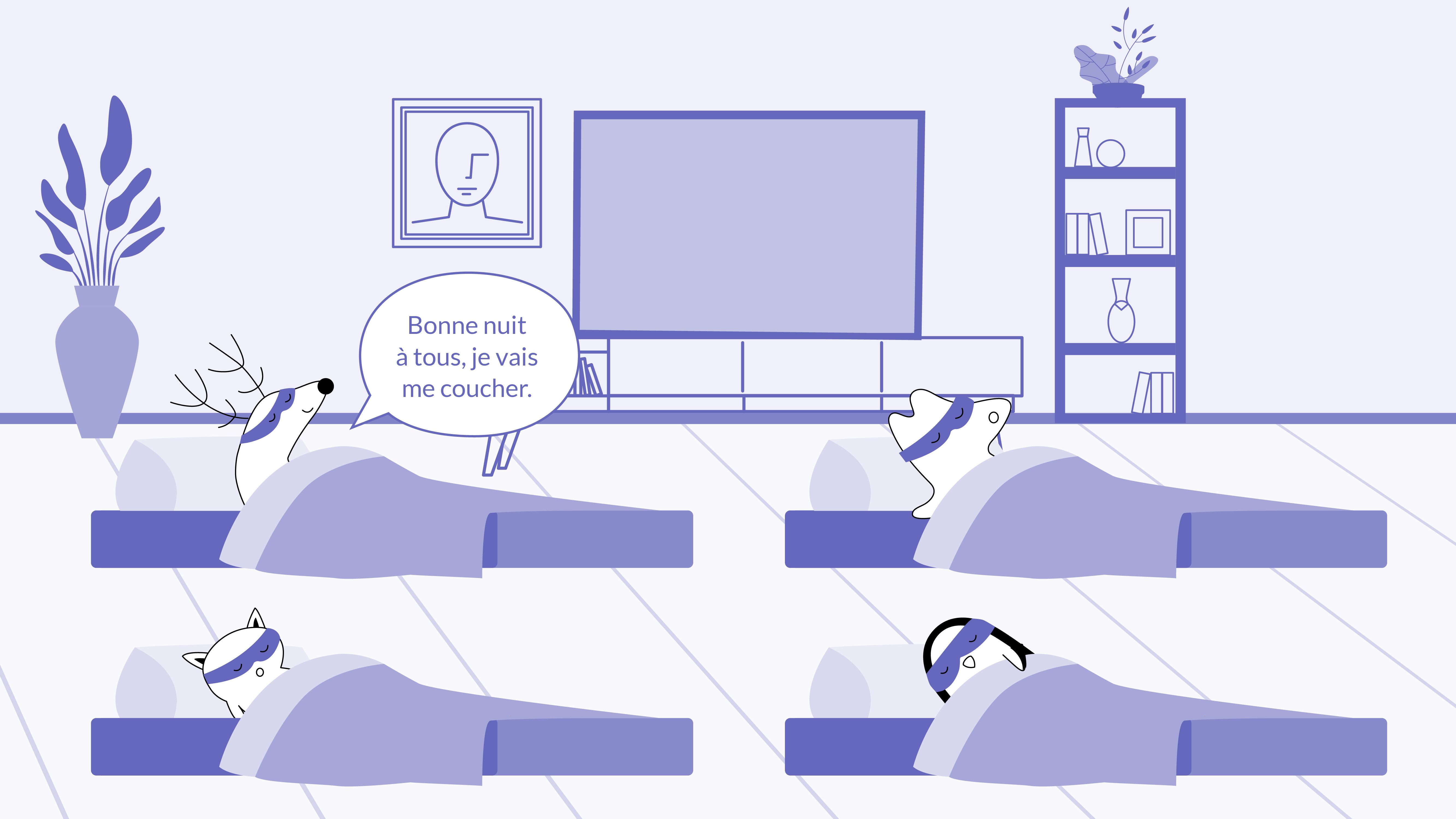
Va te reposer
In response to someone announcing Je vais me coucher, indicating they've had enough and are heading off to bed, you might want to express your concern with va te reposer. This phrase means "get some rest."
French
English
Va te reposer.
Get some rest.
Although it's not a direct equivalent of "good night," it communicates good intentions and shows that you care about the person's well-being. Remember, the tone of voice matters when delivering this phrase.
French
English
Bonne nuit, va te reposer.
Good night, go and rest.
Tu as l'air fatigué, va te reposer.
You look tired, get some rest.
C'est assez pour aujourd'hui, va te reposer.
That's enough for today, go and rest.
Va te reposer is especially suitable when you know someone has had a long day or is in need of some well-deserved rest. So, next time you want to encourage someone to take a break and rejuvenate, this phrase could be just what you need!
Final Note

Understanding how to say “good night” in French extends beyond a simple Bonne nuit. The context, location, and nature of your relationship with the person you're speaking to can influence which phrase is most appropriate.
Whether it's the formal Bonsoir, the casual Bonne soirée, or the nostalgic Bonne nuit les petits, each saying holds its own unique charm and usage.
Remember, learning a language is not just about memorizing vocabulary and grammar rules; it's also about appreciating the cultural context and emotional undertones that words carry.
Don't just learn French — experience it! Start your language learning journey today by downloading our Langster app. Bonne nuit, and happy learning!
Learn French with Langster








